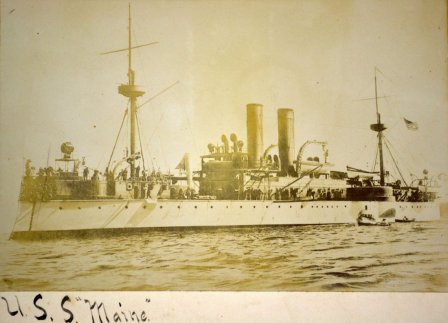This is a short little essay I had to do discussing what I thought Ambassador hays meant when he referred to the Spanish American War as a “ splendid little war.” I personally thought this was rather a silly topic to write on, as his meaning seems quite clear if you know anything about the war, but it gave me a good opportunity to give a brief synopsis of the war for anyone who doesn’t know about this minor war.
The Splendid Little War
The famous quote by American Ambassador John Hay that the Spanish American War was a “splendid little war,” was a comprehensive statement. In our day and age such a statement might be looked on with some disdain, as it seems to revel in a bloody conflict, as all wars are. But whether this phrase was truly a statement of enjoyment or merely a statement of fact, it was from an American perspective, entirely accurate. All of America’s stated political objectives were met, and it received several colonies in addition. In this essay, Ambassador Hay’s words will be treated as a statement of fact.
A brief summary of the events of the Spanish American War will help us to illustrate exactly what the Ambassador meant by his exuberant quote. The explosion of the battleship Maine on February 15, 1898, was merely the catalyst that pushed Americans over the brink to declare war on the Spanish. The Spanish colony of Cuba had long been the soft spot for the American sensibilities of independence and freedom from oppression. Beyond this, however, were added economic considerations. Continued Cuban rebellions against their oppressive Spanish masters was bad for American business there, and the Americans had much interest in the island for this reason as well. Now, with the sinking of the Maine as a rallying cry, public sentiment at last was empowered and overcame the reluctant President McKinley. America declared war on Spain.
The American Navy was the first branch to take action, quickly blockading Cuba. The Asiatic squadron under the command of Commodore Dewey also sailed for Manila Bay to attack the Spanish fleet there. This battle of Manila Bay was the first example of the “splendid little war.” The Spanish fleet was utterly destroyed and the American fleet only suffered nine casualties. A more ideal outcome to a naval conflict could hardly be imagined. It was certainly “splendid” news for the nervous President. Back in the East, the Navy once again had a Spanish Fleet trapped in a harbor. The Spanish Admiral Cervera had sailed his ships from the Cape Verde Islands to Santiago, where he was summarily confined by Rear Admiral William Sampson. The army was somewhat slower, but by mid-June, Major General William Shafter had 17,000 men ready to sail for Cuba. When they arrived, however, the disembarkation of the troops and supplies was anything but ideal. It took four days before all the men were ashore. If part of the war wasn’t providing “splendid” news it was the army’s logistical troubles and miscommunications with the Navy. But even here, while the operations weren’t going smoothly, neither were they being opposed by the enemy, which is certainly “splendid news to any commander who is having difficulty getting his men deployed and his supplies ashore.
With his troops ashore, Shafter marched on Santiago and soon forced the Spanish back to their inner defenses. With the Americans approaching by land, Admiral Cervera decided to brave the American blockade on 3 July and attempted to break out of the harbor. Once again the American fleet devastated the Spanish, taking even fewer casualties than they had in the Battle of Manila Bay. The Spanish garrison soon surrendered the city and Cuba came under American control. On July 25, General Miles landed on Puerto Rico and advanced across the island with almost no opposition. Peace came before the capture of San Juan could even be made.
In conclusion, the Spanish American war was indeed “a splendid little war” for America. From the opening shots at Manila Bay, to the end of hostilities, the Spanish American War lasted just over three months. All the political objectives that were decided upon were accomplished. The extra bonus of additional territories was above and beyond the political expectations for the war. The war could not have been more successful.



